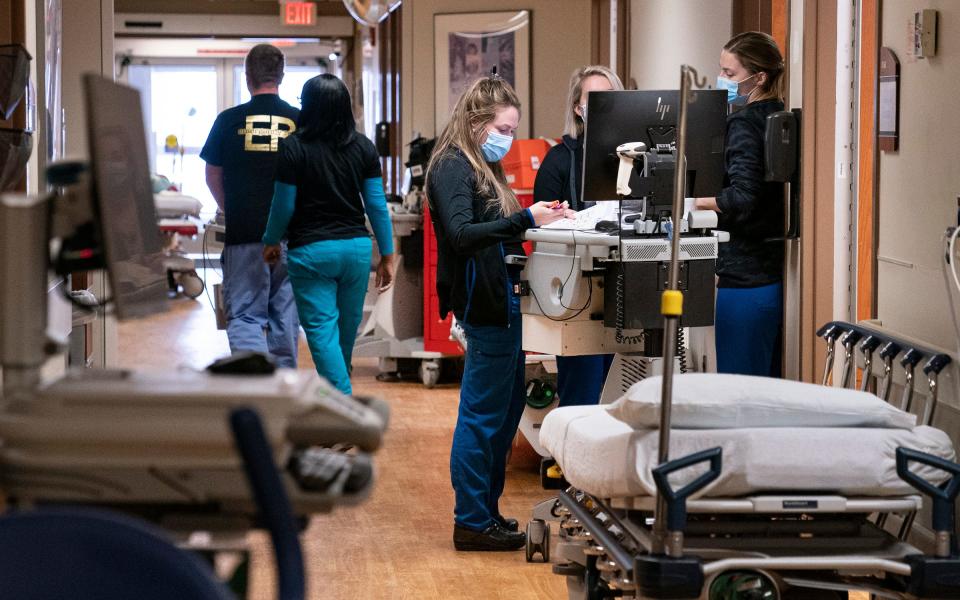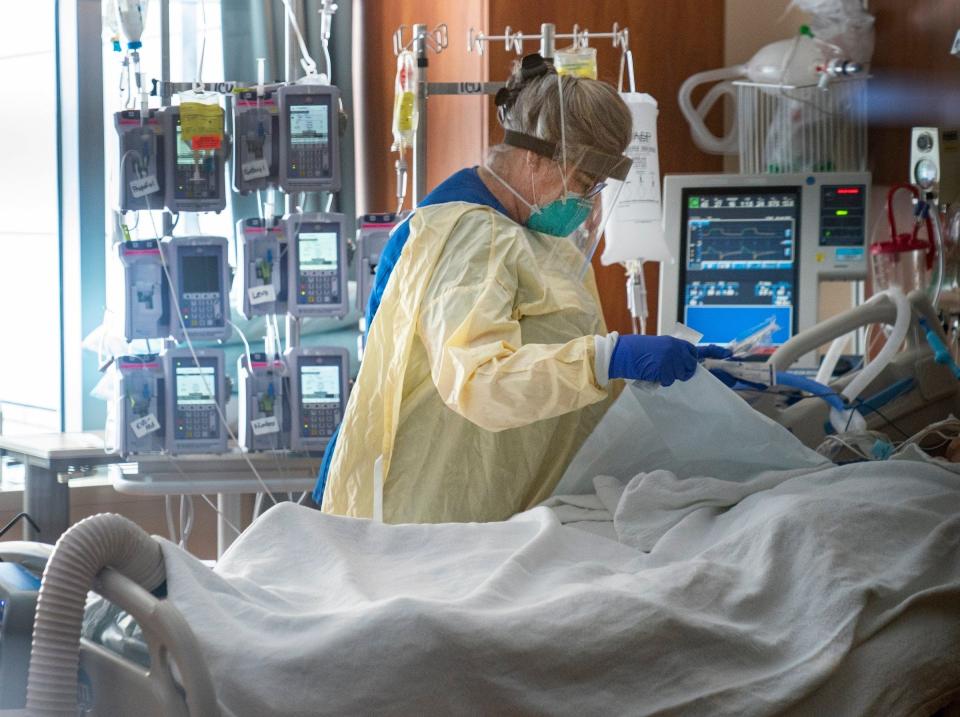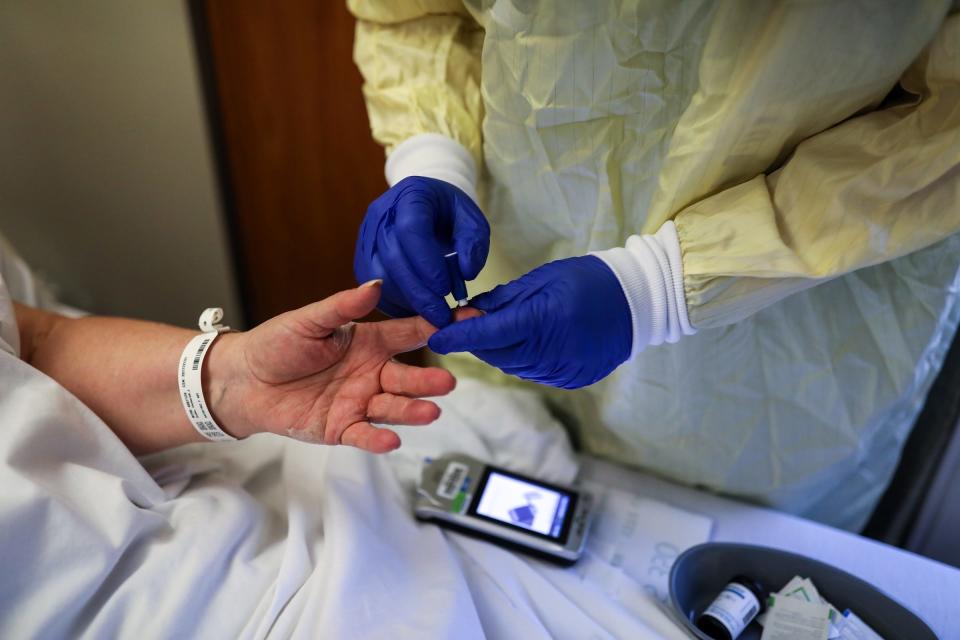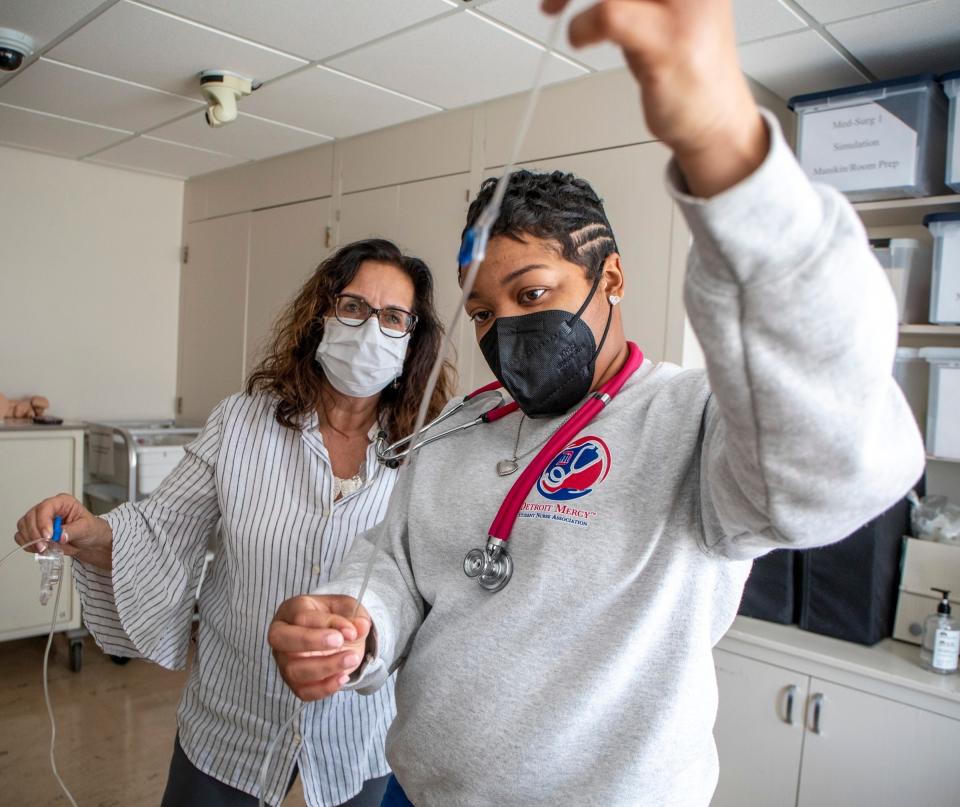Nearly 4 in 10 Michigan nurses say they plan to quit, new survey shows
About 39% of Michigan nurses surveyed for a new University of Michigan study said they intend to leave their jobs in the next year, revealing the depth of a shortage of nurses in a state that's been struggling for years to hire enough health care workers to keep hospital beds open.
Even more concerning is that 59% of newly trained nurses younger than 25 reported they planned to leave the profession in the coming year, according to the study, which was published in the journal Medical Care and surveyed 9,150 state-licensed nurses in Michigan. The researchers also collected survey responses from 1,224 nurses who left their jobs in the last two years.
"That really says to me that we have a problem with our workplace," said Christopher Friese, a professor of nursing, health management and policy at the University of Michigan and director of the Center for Improving Patient and Population Health, who was the lead author of the study. "There's a lot of calls to increase the supply of nurses, add more students, add more slots at nursing schools and things like that.

"And that's all important, but if we don't improve their working conditions, they're going to leave in droves. So just as we bring the nurses in, they're going to be very likely to leave.
"My colleagues have told me this, that they're seeing nurses join a unit, go through the orientation process and realize that it's not for them and that they don't like the working conditions and they leave soon thereafter. That's new. I haven't really seen that in 25 years."
More: Michigan has a shortage of primary care doctors: What's causing it
More: Gov. Whitmer fears impact of ruling that free ACA screenings are unconstitutional
How bad is Michigan's nursing shortage?
Since 2020, Michigan has lost 1,700 staffed hospital beds because of a lack of staffing — creating longer waits in hospital emergency departments, difficulty transferring patients to hospitals better suited to their needs and fewer services, particularly in rural areas, according to the Michigan Health and Hospital Association.
In March, Michigan hospitals had 27,000 open jobs, said Brian Peters, chief executive officer of the association.
"Michiganders deserve local access to care from their hospitals, but that access has been threatened by a generational workforce shortage," Peters said in a statement issued in March, when the Legislature approved an appropriation of $75 million for hospital staffing grants along with $67 million for nursing home workforce grants.

More: Doctor disciplined in 7 states for medical errors still practicing in Michigan
More: University of Michigan Health, Sparrow combine to form $7B system
"While our members continue to work closely with the education community to expand opportunities in the talent pipeline, this funding plays a crucial role in ensuring the viability of hospital service lines and capacity."
Friese said hospitals across the state are "in a hiring spree and a hiring frenzy. They're working really hard to bring these folks in. ... They spend a lot of time and money getting them trained, and then these folks are not there very long and say, 'I'm doing something else' and we start all over again."
What factors are driving nurses out of the profession?
"In two decades of doing this work, I don't think I've seen planned departures from the employer at rates of 39% before," Friese said. "I think that might be an all-time high."
The root of the problem, he said, is multifaceted, and includes chronic understaffing.
"Care nurses have responsibility for too many complex patients, and it's simply been too much for them to handle," he said. "They've handled it in silence for a long time, but when you survey them, that's consistently for the last decade, been the No. 1 issue for them."
In the study, 60% of the nurses surveyed reported inadequate staffing and resources to deliver adequate patient care.
More: University of Michigan nurses approve contract with $5K bonuses, 22.5% raises over 4 years
More: Michigan families now can learn details of medical errors that harm or kill

High percentages of nurses report abuse
Safety and workplace violence also ranked high on the list of concerns: 43% reported emotional abuse, 22%, reported physical abuse, 10% reported sexual abuse and 26% reported workplace bullying in the survey.
"At least anecdotally, violence has increased toward health care workers," Friese said, adding that nurses also too often feel as if administrators don't hear their concerns.
"They're not listening to the front line, who has the best lens as to what the problems are, and they're not acting on those concerns directly," Friese said. "So if I had one suggestion for health care executives, it's this: Listen very carefully to your front line. They're going to tell you where the problems are in your organization, and work really hard to tackle the issues that they bring to you.
"That's going to help improve safety, but it's also going to improve trust. And right now, I feel like there might be an erosion of trust between clinicians in the health care systems and the leaders of these systems."
Is burnout from the pandemic pushing nurses out?
About 84% of the nurses surveyed for the study said they were emotionally exhausted, but Friese said it's a leap too far to presume that's because of the coronavirus pandemic.
"I have studied nurses' working conditions for over two decades now, and I'm still a practicing nurse," he said, "and throughout the pandemic, I've been alarmed at some of the sort of Pollyannaish messaging that I've heard from some leaders that as COVID cases dropped, everything will improve and things will get better.
"That wasn't what I was seeing or hearing from my colleagues. And so our team at the School of Nursing agreed with me and we sort of redirected our resources about a year ago to launch this study and really make sure that Michigan nurses' perspectives were heard loudly and clearly because I felt like the front line was not being heard in the discussions about the current state of nursing in the state."

Previously published national studies showed that even before the first coronavirus cases were identified in the U.S., nurses were reporting very high rates of job dissatisfaction and intention to leave the field, Friese said.
"I think we need to really debunk this myth that nurses are burned out and are leaving their jobs due to COVID," he said. "That is not factually accurate. It's not supported by the data.
"Nurses are leaving their workplaces and are exhausted because their working conditions have been unacceptable for over a decade, and I believe that COVID allowed us to put a spotlight on nurses and allowed the public to realize the stressors that they've been dealing with."
How can this problem be solved?
Funding for training programs and the recruitment of new nurses is important, Friese said, but only if those new workers stay.
Adopting minimum staffing standards and enacting antiviolence legislation would help, Friese said.
"If we think that nursing care is important to the health and safety of Michiganders, then we need to invest in nursing and that means that we likely need to help our hospitals staff better," he said. "Right now, they're running as lean as they possibly can. That's been the model for about a decade. ...
"Instead of running at the bare minimum, what if we actually built some slack into the system and were able to have enough personnel so that nurses weren't running from patient to patient and actually had the time and space they need to care for these really complicated patients?

"That's going to take two things: It's going to take health care executives acknowledging the problem and redirecting financial resources to that goal, and they've been reluctant to do that ... because that's expensive."
"The second piece is we need to make sure that nurses and other health care workers are safe and supported in their workplaces."
What else is is really important about this issue?
"I'm still optimistic for nursing," Friese said. "We get through these challenges, historically, but we really do need partnership and support from other clinicians, from health care executives, from policymakers."
He'd like to see Michigan adopt legislation that also allows nurse practitioners more autonomy to practice without physician oversight. And if Michigan joined a compact that allows nurses with licenses in 39 other states to practice here, that could help, too, Friese said.
"The state of Michigan is not a nurse-friendly state from a policy perspective," he said. "We've got outdated nurse practitioner legislation. We don't allow RNs (registered nurses) to practice across state borders like other states. ... We can improve the situation if we focus our efforts. I'm optimistic that things will get better, but it's going to take effort and it's going to take help."
Contact Kristen Shamus: kshamus@freepress.com. Follow her on Twitter @kristenshamus. Subscribe to the Free Press.
This article originally appeared on Detroit Free Press: Michigan nurse shortage: Study shows 4 in 10 plan to quit

